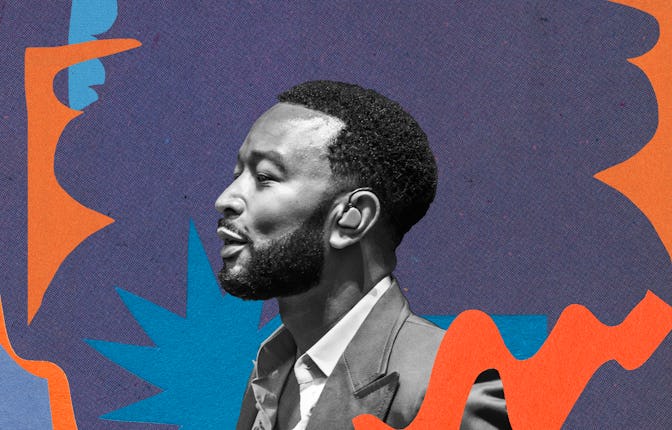John Legend’s new album is offensively inoffensive
‘Legend’ dabbles in every corner of contemporary pop, but is too timid to make a profound statement.

Several times while listening to John Legend’s meandering, 81-minute new album, Legend, I had to stop and check whether there was a prom being held in the basement of my building. There is something that happens to very rich musicians when they reach a certain age: they get interested in everything. Legend is 43 and has sold more than ten million records over the past two decades. On his Twitter feed, where he is perfectly amiable and an earnest advocate for a variety of social justice causes, he recently tweeted that the “rumors of the death of R&B” are greatly exaggerated; this is true, but his record has little to do with it. This is not because Legend is somehow illegitimate when it does loop back around to the genre. It’s because the LP, which is nominally split into two discs but feels more like an amorphous sample of a publishing company’s hard drive, dabbles in every corner of contemporary pop, too polite and too timid to drive down into any one.
Legend’s public image has always seemed stuck between genre revivalist and aspirant superstar. A regular church pianist by age 10, his excellent debut album, 2004’s Get Lifted, was executive produced by Kanye West, who had tapped him to appear on his own debut from that year, The College Dropout, and who was touting the Ohio native as the spiritual counterpoint to the era’s allegedly shallow R&B superstars. Despite the five-year break that preceded 2013’s Love in the Future, each of Legend’s first four albums was certified platinum and debuted in the top four on the Billboard 200.
But the arc of this opening run bent away from the soul- and gospel-tinged R&B of his debut, which hinged on audacious vocal performances, and toward a Top 40 omnivorousness that guaranteed a sort of soft ubiquity while diluting the notion of a John Legend song. The spare “All Of Me,” from Love in the Future, is his last truly massive single, dwarfing everything that has followed, not only commercially but creatively. To listen to 2020’s Bigger Love is to stare at a Matrix-like bank of source code designed to hack into the stereo systems of sensible family SUVs: numbingly obvious samples rendered with professional sterility.
And so the Legend who arrives on Legend pivots back and forth between staid mall versions of older, more soulful songs — including his own — and vaguely undignified trend hopping. Imagine if Michael Buble had Rick Ross’ phone number. Actually, Ross does appear here, on the opener “Rounds,” where his voice is mixed less like a rapper’s and more like a voiceover artist’s. It’s the sort of small, perfectly representational choice that dogs Legend throughout: idiosyncrasy reproduced as inoffensive gesture.
The title “Rounds” refers to precisely what you’re afraid it might. Legend’s come-ons have always had the energy of someone you used to babysit who’s out prove he isn’t such a little kid anymore, but Legend carries this to its absurd extreme: the sheer number of metaphors for sex (a waterslide, “dope,” holy water, honey, speaking in tongues, so on) is dizzying, the effect never once erotic. This is hampered by the hackily trite writing that characterizes nearly every song; see him promising to “taste those thighs/make ‘em touch the sky.”
That sort of songwriting — overbaked on levels of structure and guiding metaphor, stunningly lazy in the micro — is the exact recipe comedians follow when parodying acts like Legend. Between taking the listener halfway to church (the Jazmine Sullivan-assisted “Love”) or to set for commercials selling mass-market rum (“Guy Like Me”), he taps into circa-2011 Tumblr to compare a lover to stardust (“You are made of stardust/The universe inside you, yeah/A straight-up miracle/It's so incredible”) or, on “Nervous,” into “that existential feelin’ when you’re staring at the stars.” But the album’s true nadir is “Wonder Woman,” whose title has an implied comma, as in:
“You make me wonder, woman
How do you do it?
You’re superhuman.”
Legend grows so predictable in this way that, if a first-time listener were to peek ahead at the tracklist, she would immediately understand that the title “I Don’t Love You Like I Used To” is qualified by the lyric “I love you so much more.”
Legend is more offensive on close inspection than the way it was likely meant to be consumed, which is to say “as wallpaper.” Only toward its very end does its length come to feel unjustified; songs like “Pieces,” with their easy therapyspeak sentiments, collapse under the weight of all the anesthetized pop that came before it. At the album’s close, Legend shirks both of these modes in favor of a deeply felt song for his children. “Home” is treacly, but it pushes through this in an attempt to resolve the blanket powerlessness that comes with parenthood. More importantly, it requires him to open up as a vocalist. For an artist with undeniable talent, virtually every other song on Legend could swap out the headliner for any one of the innumerable, interchangeable singers who have churned out material indistinguishable from it.